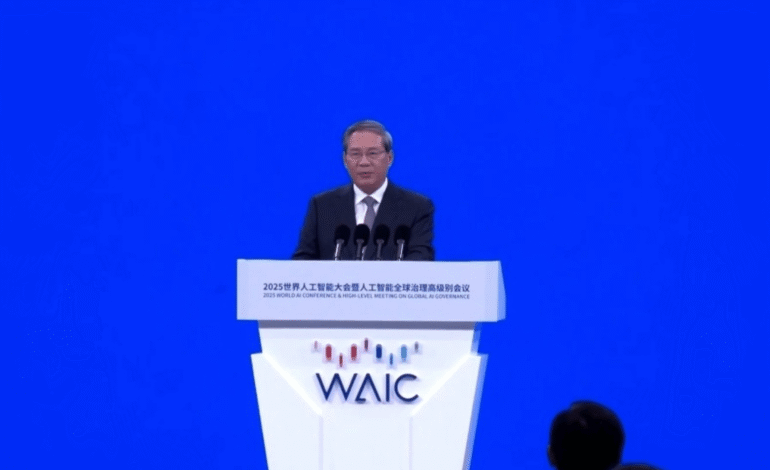China Proposes Global AI Cooperation Framework to Boost Innovation Worldwide

In a bold and forward-thinking move, China has proposed the establishment of a Global Artificial Intelligence (AI) Cooperation Organization, aimed at creating a unified and inclusive framework for international collaboration in AI research, development, governance, and deployment. The proposal was announced at a major international conference on AI governance, attended by more than 1,000 delegates from governments, universities, research institutions, and industries around the world.
This initiative underscores China’s growing leadership in emerging technologies and signals a strong intention to promote ethical AI innovation, especially among countries in the Global South. The idea reflects a global recognition of the need to harness artificial intelligence responsibly, while also ensuring that no country is left behind in the Fourth Industrial Revolution.
A Strategic Shift: From National Power to Global AI Governance
China’s call to form a global AI cooperation body marks a pivotal shift in the international AI landscape. Instead of solely focusing on domestic supremacy, Beijing is now extending a diplomatic hand to foster a multilateral AI ecosystem where knowledge, technology, and governance practices are shared transparently across borders.
According to senior Chinese officials at the event, the proposed organization will serve as a platform for dialogue, regulation, and innovation, ensuring that all nations regardless of their economic status benefit from the technological advancements that AI promises. In this respect, the cooperation organization could act as a global AI policy forum, similar to the role of the World Trade Organization (WTO) in international commerce or the International Atomic Energy Agency (IAEA) in nuclear oversight.
This pivot in China’s AI strategy shows a growing interest in building trust and transparency in emerging technologies qualities that are essential in sensitive applications such as surveillance, military use, and deep learning algorithms.
Key Objectives of the Global AI Cooperation Organization
The proposed organization would work on a set of comprehensive goals that align with the broader vision of AI for Good. These goals include:
- Establishing universal principles for responsible AI development
- Facilitating joint technical research and shared innovation initiatives
- Promoting open-source technology sharing and AI capacity building
- Ensuring ethical AI deployment, especially in developing nations
- Creating common standards for safety, bias prevention, and explainability
- Encouraging educational and institutional support for AI literacy
This initiative would also help coordinate international AI governance frameworks at a time when divergent national regulations risk fragmenting the global AI landscape. From data privacy laws to automated decision-making, having a central body could reduce technological silos and ensure more synchronized innovation.
China’s Commitment to Open Source and Shared Research
One of the most important highlights from the event was China’s offer to open-source its AI products and technologies, inviting countries from across the globe to collaborate in real-time development. Chinese representatives emphasized their willingness to undertake joint research with international partners, particularly those from developing economies.
By making open-source tools more widely available, China aims to bridge the digital divide and empower under-resourced nations with the technical tools needed to enter the AI era. This is particularly significant for regions like the Middle East, Africa, Southeast Asia, and Latin America, which often lack the funding or infrastructure to launch advanced AI projects.
Furthermore, the offer to collaborate in open innovation shows that China recognizes the global nature of AI’s impact from climate modeling and public health to autonomous transportation and financial prediction systems.
Global South at the Core of AI Capacity Building
In a rare and explicit acknowledgment, China underscored the importance of empowering the Global South with access to AI infrastructure, training, and governance models. Many of these nations face systemic challenges in digitization, talent acquisition, and funding, making international support essential.
The Global AI Cooperation Organization would help countries develop their own AI strategies, localize AI governance policies, and integrate automation solutions tailored to unique regional needs such as desert agriculture in the UAE or water scarcity prediction in sub-Saharan Africa.
By placing the Global South at the center of the agenda, this initiative takes a bold stance on inclusive AI development ensuring the benefits of AI are distributed equitably, and not just hoarded by technologically dominant nations.
An Action Plan for AI Governance Announced
Coinciding with the announcement, China unveiled a comprehensive Action Plan for Global AI Governance, outlining a framework for ethical development, implementation, and management of AI technologies. This plan emphasizes the need for:
- Transparency in algorithm design
- Accountability in AI-based decision-making
- Inclusivity in technological advancement
- Security against malicious AI threats
- Sustainability in data use and computing resources
The action plan also encourages countries to develop AI legislation that respects local norms while adhering to international ethical standards. With countries like the UAE and Saudi Arabia rapidly adopting smart governance and AI-powered systems, such a plan offers timely guidance and policy architecture.
Implications for the UAE and Middle East
For the UAE and other Gulf countries that are heavily investing in AI-driven smart cities, autonomous systems, and predictive analytics, the creation of a global AI cooperation body presents significant opportunities. The UAE has already established a Ministry of Artificial Intelligence, rolled out national strategies, and launched multiple innovation hubs.
Aligning with China’s proposed framework could bring the following benefits to the Middle East:
- Access to open-source AI platforms from China
- Joint R&D opportunities with Chinese and global experts
- Training programs and AI literacy workshops for government and youth
- Guidelines for responsible AI in fintech, healthcare, and urban planning
- Enhanced international recognition for AI innovation in the Arab region
Furthermore, the Abu Dhabi AI Summit and Dubai’s World Government Summit can potentially integrate the proposed organization’s principles and host future multilateral discussions on global AI governance.
Academic and Industry Participation: A Multi-Stakeholder Approach
The conference witnessed participation from a broad range of stakeholders, including universities, private sector leaders, tech innovators, and policy makers. This reflects a shared consensus that AI governance must be multidisciplinary and cannot be regulated solely by government entities.
Academic institutions offered perspectives on the ethical ramifications of AI bias, data ownership, and automation risks, while corporations focused on the need for interoperability standards, cloud infrastructure integration, and IP sharing mechanisms.
In particular, representatives from the Middle East academic community emphasized Arabic language AI development, regional data modeling, and inclusivity for local innovation ecosystems. These goals align with China’s push for an inclusive AI agenda that supports localized deployment.
China’s Rising Influence in the Global AI Arena
This initiative also signals China’s strategic intention to lead not just compete in the global AI domain. While countries like the U.S. and members of the European Union have been working on their own AI governance models, China’s approach differs in its collaborative, open-source, and inclusive rhetoric.
By proposing a neutral international body, China positions itself as a thought leader capable of setting agendas rather than just following trends. It also offers an alternative to the Western-led AI governance narrative, especially in regions seeking non-aligned technology partners.
Given the UAE’s balanced global partnerships and vision for becoming a regional AI powerhouse, aligning with this initiative could help Dubai, Abu Dhabi, and Riyadh deepen their role in international technology diplomacy.
Building Trust in AI: A Collective Responsibility
As artificial intelligence systems become increasingly embedded in everyday life from health diagnostics and education to legal systems and transportation the need for global trust and oversight becomes critical. China’s call for an international AI body reflects growing awareness of these risks.
Misuse of AI can lead to unintended harm from data breaches and algorithmic discrimination to mass surveillance and loss of employment. Having a multilateral institution dedicated to mitigating these risks is not just a good idea it’s a necessity.
The Global AI Cooperation Organization, if successfully implemented, can establish audit mechanisms, global certification standards, and cross-border ethics councils, all of which can serve to build and sustain public trust.
A Global Framework for a Shared Digital Future
China’s proposal to create a Global AI Cooperation Organization is more than a geopolitical strategy it is a vision for collective innovation, inclusive development, and responsible governance. It opens doors for developing nations, offers tools to those lacking infrastructure, and seeks to balance power in an AI-driven world.
With participation from over a thousand experts and the announcement of a comprehensive AI governance action plan, this move sets the stage for a new era of digital diplomacy.
Countries like the UAE and broader Middle East have an important role to play in this evolving ecosystem both as early adopters and as shapers of responsible AI policy.
As artificial intelligence becomes the defining force of this century, international cooperation will be the cornerstone of progress. And through initiatives like this, the world can ensure AI remains a force for good, innovation, and equality.







